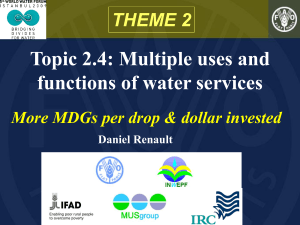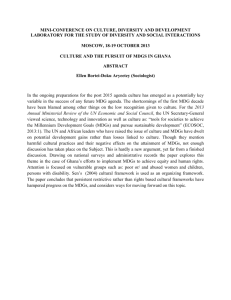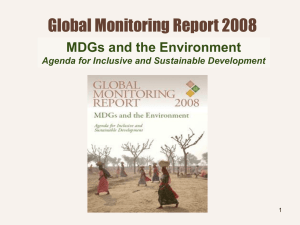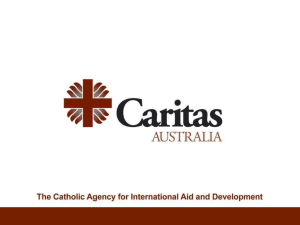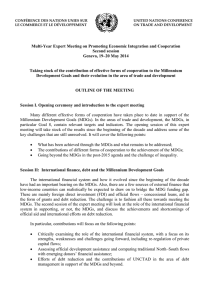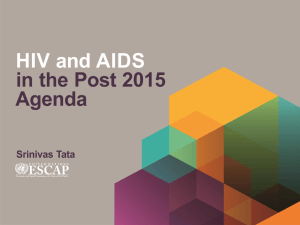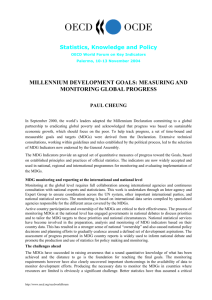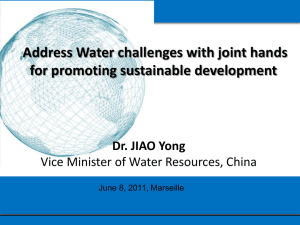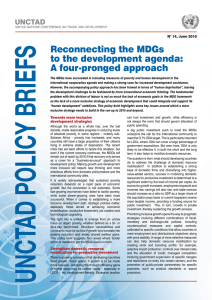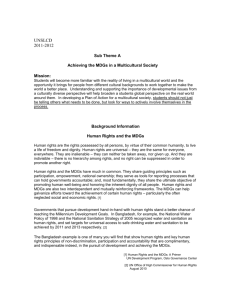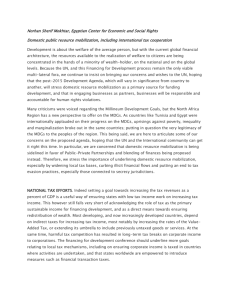intervention of mr. velikhov_to the 2014 plenary assembly of the un
advertisement
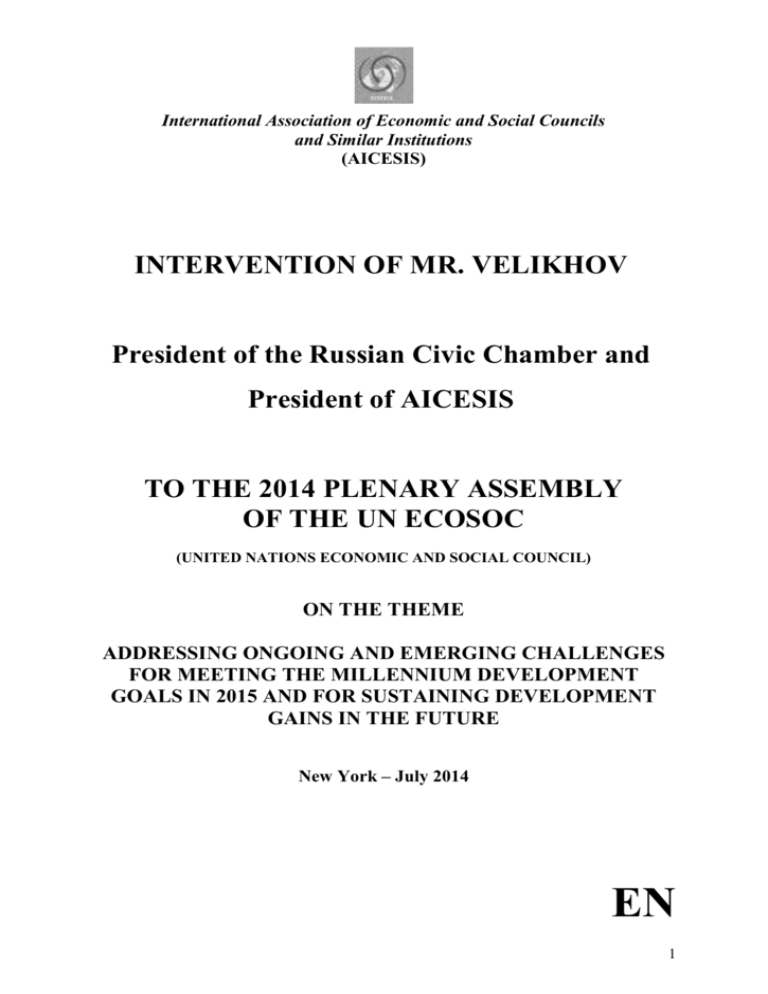
International Association of Economic and Social Councils and Similar Institutions (AICESIS) INTERVENTION OF MR. VELIKHOV President of the Russian Civic Chamber and President of AICESIS TO THE 2014 PLENARY ASSEMBLY OF THE UN ECOSOC (UNITED NATIONS ECONOMIC AND SOCIAL COUNCIL) ON THE THEME ADDRESSING ONGOING AND EMERGING CHALLENGES FOR MEETING THE MILLENNIUM DEVELOPMENT GOALS IN 2015 AND FOR SUSTAINING DEVELOPMENT GAINS IN THE FUTURE New York – July 2014 EN 1 Dear Colleagues, Ladies and Gentlemen, Less than two years from the expiration of the deadline set for the MDGs achievement, their evaluation at the global level, shows that despite real progress, the most vulnerable populations have not known a significant worsening in their respective socio-economic conditions, compromising the vision for a better future praised by UN Member States in 2000. As we approach the expiration of the deadline, the record of MDGs achievements remains in deficit, especially in the poorest developing countries, with big gaps between and within countries. Several reasons show that the estimated progress rates could not be achieved, mainly due to: • The financial crisis turning into a real economic crisis challenging the current development model; • Wide fluctuations in raw materials prices, with a sharp increase during the pre-crisis period, followed by a fall affecting the earnings of developing countries in addition to keeping oil prices at high levels; • Social movements around the world denouncing the increase of inequalities and lack of opportunities for social development as well as for job creation, causing sometimes significant migration movements; • A weak governance and a lack of coherent public policies. This context has produced a strong weakening in the ability of countries to allocate the needed resources funds for ensuring the MDGs achievement. Similarly, the overall amount of development aid has been reduced because of the austerity policies imposed by the economic and financial crisis, which has undermined their achievement. Certainly, the commitment of the international community as well as the efforts made by various active actors in the development would be able to support some countries in the achievement of several targets by 2015. Nevertheless concrete, sustainable and viable commitments and actions to be undertaken in the aftermath of 2015 should be defined by adopting a global approach based on fundamental human rights and involving civil society organizations. Today, a new global development program for 2030 is in the agenda. It has incorporated other goals to take over the MDGs in order to protect the planet and promote equity, justice and prosperity. Besides the current eight MDGs, sustainable development, inclusive economy, sustainable industrialization, climate change issues, human rights, peace and security international have been included. AICESIS believes that the new program is in line with the expectations as long as the content is concerned with three fundamental principles, namely: (i) inclusion, (ii) sustainability, and (iii) resilience to the crisis. The defined objectives are more global and can positively affect the level of development in different countries. In this respect, the inclusive industrialization proposed by the program is expected to create new jobs throughout the emergence of a new international division of labor focusing on a better integration of developing countries into new value chains. This would affect on the mean income per person and allow the development of a dynamic and entrepreneurial middle class. Furthermore, the new program consists of a new approach based on the third generation of human rights. This new approach, in addition to social, economic and cultural rights, has included collective rights of societies or peoples, such as the right to sustainable development, peace and a healthy environment. In this regard, the repository of the social charter developed by the ESEC of Morocco and adopted by other ESCs - advocating the rights and standards 2 associated with operational objectives and supported about 250 indicators for monitoring and progress - could represent the basis for the enrichment of the proposed new program. Navertheless, AICESIS has been warming the international community about the risk of dispersion efforts due to the increased number of selected targets, thus limiting the potential for achieving the expected human development. Therefore, it calls for a more global and integrated approach aimed at strengthening synergies between the multiple dimensions addressed by the new MDGs agenda. AISESIS considers that it should also build on successful experiences in the context of the MDGs and share these experiences in the context of South-South cooperation to build a more inclusive and balanced society. Reducing inequalities, strengthening justice and equity, human rights and participatory democracy and the various aspects of good governance are all challenges under the new program development. The international community should, in turn, honor its commitments by developing aid and adopting innovative financing mechanisms. Therefore, the development agenda beyond 2015 should emphasis more on the need to ensure structural changes at the global level and be based on a new economic model promoting inclusive, sustainable and equitable economic growth, agricultural guaranteeing food security, taking into account both climate and demographic changes, and resulting in a social and equitable economy as well as secondary and tertiary sectors able to create sufficient added value to meet current changes. The development agenda should be based on a strong organized civil society, committed to all segments of society as a whole and offer a greater role for youth, women, children, elderly, vulnerable groups and migrants, ensuring a greater coherence and adaptation of public policies to the national, regional and local contexts. Each country should be indeed able to adapt and implement the most appropriate solutions according to its own characteristics, situation, needs and realities. This model should also refer to the decisions taken at the Rio +20 Summit in particular concerning inclusive economic development, environment protection, natural resource sustainability, peace and security. Pan-African initiatives, national and regional consultations, as well as UN forums, such as the International Conference on Population and Development +20 are also references to be considered. The new model will be able to have a positive impact on the agenda beyond 2015 only with the promotion of responsible governance and participatory democracy. This requires the development of appropriate mechanisms and tools for participation to promote the involvement of all stakeholders including civil society, right from the design phase of the new program, passing throughout their execution and monitoring, till their content evaluation, while ensuring greater transparency and establishing obligations for accountability. A system of monitoring and evaluation for the objectives of the development agenda beyond 2015 must be set with the introduction of performance and impact indicators ensuring the monitoring of the progress made by different countries. In this regard, development of new composite indices is essential for tracking and monitoring the program and better understanding the progress made by countries in sustainable human development. Finally, AICESIS as organized civil society, bringing together economic and social councils in several countries will continue to mobilize itself for further reflection on the MDGs by 2030, ensuring effective exchange of experiences and best practices between its members. This analysis should address major development challenges over the next fifteen years and 3 consider how the international community could help address this by taking into account previous experiences in implementing the MDGs. Thank you for your attention. 4
